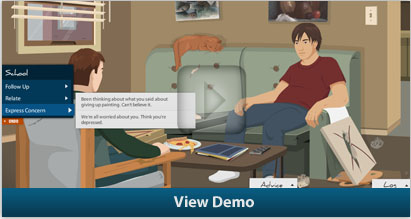
An online training available at Northern Arizona University allows users to learn the common indicators of psychological distress and how best to approach at-risk students for referral to counseling.
NAU offers two Kognito programs, At-Risk for College Students and At-Risk for Faculty & Staff. Each training program is tailored to a specific type of user: college students and residential advisers, as well as administrators, faculty and staff, respectively. University employees and students can access the training using the enrollment codes found on the Health Promotions website.
“This is a very exciting program because it is so interactive,” said Melissa Griffin, Health Promotions manager for Campus Health Services. “So far, student response and learning outcomes have been very positive.”
In At-Risk, users assume the role of a faculty member or student (depending on the program) who is concerned about several students. Users first analyze profiles of these virtual students in order to identify the ones who are at-risk. They then engage those students in simulated realistic conversations to determine whether and how to refer them to the campus counseling centers. The virtual students are fully animated and possess their own emotional intelligence and memory. The training is completed once the user successfully identifies and refers the proper at-risk students.
In a study conducted by Kognito Interactive, students who completed the training were more likely to intervene when a fellow student exhibited signs of depression or suicidal ideation.
Ron Goldman, co-founder and CEO of Kognito, said the At-Risk programs are “the first online trainings available to provide realistic and risk-free online role-play exercises in identifying, speaking with, and referring students in need.”



